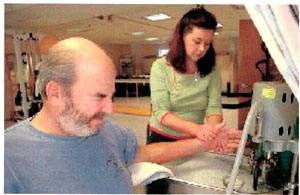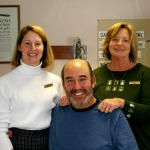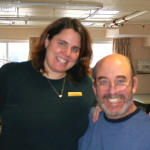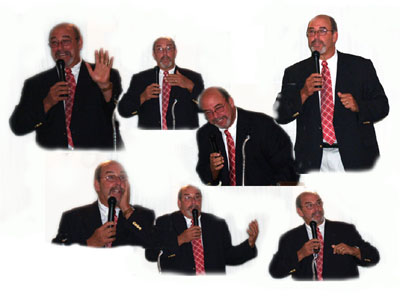Community Health Focus: David Ranzer's "Miracle"
By Susan Bush - February, 03 2006
Sweet Brook Director of Rehabilitative Services Jane Edge and David Ranzer of Williamstown.[see related story "Sweet Brook Services" on Community News page]
Williamstown - In a matter of seconds on Oct. 25, David Ranzer's life was forever changed.
Ranzer, 61, was driving north on Route 7, heading toward his Sweet Brook Road home. There had been snow that day, but the road home seemed safe, Ranzer recalled.
He remembers passing by a southbound school bus, and then, chaos.
"I went into a skid," Ranzer said during an interview from his room at the Sweet Brook Transitional Care and Living Center. "I seem to remember as I skidded off the road that I may have driven into the skid."
His vehicle struck and wrapped around a tree, and a critically injured Ranzer was plunged into unconsciousness, he said.
The school bus Ranzer saw had stopped at the home of Dr. Jonathan Krant to discharge a passenger, and Krant either saw or heard the crash, Ranzer said. Krant ran to the scene and delivered aid to Ranzer, Ranzer said.
"Apparently, Jon was right there," Ranzer said. "I was unconscious and I don't remember the crash, I don't remember the airbag deploying at all. [Krant] recognized me and he said 'David, do you know your phone number,' and I guess I did, and then he asked if I knew Joanne's [Ranzer's wife] cell phone number and I didn't, which, considering I'd had the phone for two years before giving it to her, seemed odd."
Life Saved At BMC Trauma Center
Ranzer was taken to the Berkshire Medical Center and admitted to the BMC Trauma Center. His injuries were life-threatening and included head trauma, broken ribs, collapsed lung, and broken bones in his wrist. He sustained a spinal injury and was kept in a medically-induced coma for several days, Ranzer said.
Things initially appeared extremely bleak for Ranzer, a vice-president of the Merrill-Lynch company in Pittsfield, but on Feb. 1, a talkative, smiling, and clearly appreciative Ranzer appeared well on the road to recovery. Ranzer termed his dramatic progress a "miracle," and credits his recovery to medical care he received at BMC and physical and occupational therapy programs at Sweet Brook.
"In two months of therapy, nearly all my function has been restored," Ranzer said. "[Therapists, nurses, nursing assistants] are just so incredibly good, and I'm not talking about just doing their job. They bring so much education to it and I am in awe of the care, the skill, and the dedication of this place."
Ranzer had equally high praise for his care at BMC. He acknowledged the efforts of BMC Trauma Center Medical Director Dr. Sheldon Brotman ["He's a lot of fun to be around," Ranzer said,] and neurosurgeon Dr.Todd Lasner.
"I think the care I got from the doctors, the nurses, and the aides was wonderful," Ranzer said. "The quality [at BMC] was at a wonderful level."
Complications
While at BMC, Ranzer endured several complications; while under the influence of morphine and in the medically-induced coma, he experienced hallucinations that made him pull out various medical tubes connected to his body, Ranzer said.
The tube-tearing caused a "bacterial spray" that led to an infection, which was successfully treated but caused a cancellation of spinal surgery. The surgery was re-scheduled and Ranzer was about to undergo the operation when he was found to be suffering from a significant number of blood clots. Surgery was again cancelled.
For surgery to occur, Ranzer had to be free of all blood clots.
Ultimately, he opted against the surgery. He was bedridden and nearly immobile when he arrived at Sweet Brook for rehabilitation services, he said.
A Long Road And "Wonderful People"
Sweet Brook rehabilitative services staff members Laura McGrath and Martha Leja are with Ranzer.
He spent his hours in a specially-designed bed that shifts patients from their right to left sides and onto their backs to avoid bedsores,pneumonia, and other problems associated with long-term immobility.
"I came here and here I have this incredible bed," Ranzer said. "And there are these wonderful people, Paul Jangrow [director of Social Services], Cindy Dix [transitional care manager], all these nurses and these wonderful CNAs [certified nursing assistants]. They did so much; Cindy Dix made it her business to learn how to operate this complicated bed. And it isn't anybody's job to stop by [his room] just to say 'hi,' but they do it."
Ranzer's spinal injury had to be completely healed before he could begin the therapies that would hopefully set him on his feet again. Ranzer received much therapy while he remained in bed, he said, but was very eager to begin the more rigorous work that would restore his ability to walk and move about. That therapy began in January, and Ranzer has made much progress. Physical and occupational therapy occurs six days a week, he said.
Jane Edge is the director of rehabilitative services.
Progress
"When David came to us, it was for 12 weeks bed rest," she said. "We had to do a lot of strengthening while he was on bed rest. We had to be certain that he was ready to sit on the edge of the bed and for standing. Therapy was twice a day for about three to four hours a day. When we had the go-ahead from his physician [to introduce mobility and standing] we warned David about some of the possible issues, but the only thing that happened [when Ranzer was first moved to an upright sitting position] was his blood pressure went up."
Nausea and vomiting are among the consequences that may occur when a person concludes an extended period of bed rest, Edge said.
Ranzer now uses a wheelchair, which he powered with his feet during the interview, and has had almost all function restored to his injured left wrist. He is able to transfer from bed to chair with supervision and is also using a walker. Ranzer has worked with parallel bars and therapy that involves navigating a set of stairs is underway, Edge said.
"We had him in a standing table to increase endurance, and using parallel bars to practice steps," Edge said. "I believe he will have a full recovery."
Ranzer may be headed home sometime this month and will likely receive in-home therapy. Ranzer will make a visit to his home before any discharge so that his ability to navigate within the home environment can be evaluated, Edge said. Ranzer said that he plans to remain home for about two weeks and then take a six-week trip to Florida.
"My Eyes Have Been Opened Wide"
The long recovery, the extended period of bed rest, the care he's received and his positive prognosis have impacted Ranzer in ways beyond the physical, he said. His personal experiences and encounters have made him "a changed man," he said, and Ranzer names names.
"The certified nurses aides are all really, really good," he said. "My eyes have been opened wide, I've learned so much about these people. I've gathered so much respect for health care workers in general, and these dedicated, caring compassionate aides are overworked and underpaid. Let's be honest, these are people I wouldn't have met otherwise. They come in here, they work all these hours, and they took care of me when I couldn't do anything for myself, when I was helpless and dependent and it was so hard for me. This recovery, everything, has been the hardest thing I've ever done in my life."
Ranzer offered his praise and appreciation to all the CNAs who cared for him and specific praise for CNAs Jennifer Sprague, Crystal Ramos, Debbie Sherman, Missy Sumner, Brittany Maxwell, Eric Phelps and Kevin Dunlop.
Elise Martin is another dedicated professional, Ranzer said.
"I'm still using a bedpan," Ranzer said. "After an accident, believe me, I have no modesty left. I've asked these guys, 'how do you do this,' and they say 'it's part of the job and we just do it.' I have come to admire and respect them."
The Sweet Brook nursing staff is dedicated and caring, Ranzer said, and he acknowledged several nurses who spent time with him.
Nurses Deb Haig, Cathy Lamoreaux, and Christine Collins are "unbelievable," said Ranzer.
"Christine sounds like [television actress] Roseanne and she is the most caring 'drill sergeant' I've ever known," Ranzer said with a wide, dazzling smile. "These nurses make it a habit to see if I need anything or want anything. They are great, great, great."
Physical and occupational therapists and assistants were also cited by Ranzer as integral forces to his recovery. Barbara Allen acted as Ranzer's primary physical therapist. Edge was Ranzer's primary occupational therapist. Ranzer also worked with Pam Moore, Laura McGrath, Ann Kwiecinski, rehab aid Martha Leja and physical therapy assistant Jean Doyle.
"They are the best, the best there is," Ranzer said.
Sweet Brook physical therapy assistant Jean Doyle joined David Ranzer for a photo.
Ranzer is so impressed with the Sweet Brook staff, patient care, and other services that he plans to become a volunteer at the facility, he said.
Family, Friends, and God
His self-described "miracle recovery" would not have occurred without support from his wife Joanne and daughters Karen and Corey, Ranzer said. After his accident, Karen returned from England and Corey arrived from New York City, Ranzer said. The daughters became a "team" with Joanne Ranzer.
"I watched them function in a way I'd never seen before and it blew me away," Ranzer said.
He is a member of Congregation Beth Israel in North Adams, and his congregation community has offered tremendous support, he said. Business clients have gone out of their way to assist and cheer him, Ranzer said.
"I have had clients drive four hours from New York City to come and sit with me for an hour-and-a-half," said a clearly appreciative Ranzer. "And Merrill-Lynch has been very supportive and generous."
And there are no miracles without God, Ranzer said.
"I am grateful to God for giving me a second chance," he said. "I hope to prove worthy of that; life and death is so random. There are 18-year-olds who die in crashes while a 61-year-old survives. That's how unpredictable it can be and if you get the second chance, you better take it."



